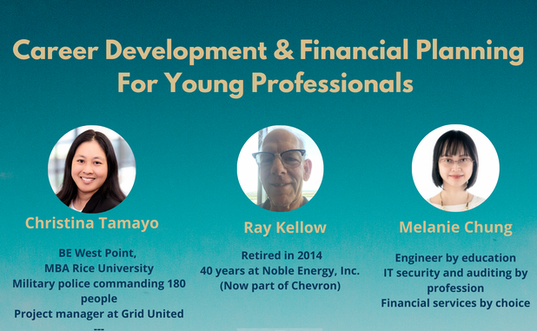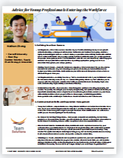|
We had a very successful event on Sunday. Thanks to the 3 great speakers and the audience who showed up in person or on Zoom.
Download Nathan's advice (PDF) About the author - Nathan Zheng Cornell University, Bachelor's of Engineer Best Buy Decision Scientist- Supply Chain strategy & Innovation 1. Defining Your Own Success
a. Setting Goals – What does success look like to you? Is it maintaining steady career growth while maintaining a strong work-life balance for friends and hobbies? Is it going all-in for a highly demanding job to make as much money as possible and sacrificing short-term comfort for an earlier retirement? Do you enjoy solving technical problems or do you want to go down the people management track? Your definition of a rich-life can change and most likely will change, however, you should think about what your rich-life looks like. This will allow you to set appropriate goals and have conviction along your own unique journey. b. Finding Your Balance – Work-life balance is subjective. What is balanced for you may not be balanced for someone else, but knowing your goals will enable you to determine how to budget your time and efforts. Don’t compare your differences in lifestyle to others who have different life goals than you. c. Setting Boundaries – Learning how to say “no” is an underrated skill. If your definition of work-life balance is clocking out each day at a certain time, being able to say “no” will allow you to keep up with the after-work activities that fulfill you. No matter if you work 40-hour or 80-hour weeks, being able to say “no” will allow you to focus more efficiently on delivering high-visibility work and developing high-value skills that will elevate your career. d. Maintain Your Health – Your career is a marathon, not a sprint. Eat healthy, sleep right, and exercise frequently. Investing in your own physical, mental, and spiritual health will enable you to perform consistently and at a higher level. Nevertheless, marathons are not easy and there will certainly be times where you get off track. However, by establishing good time management skills and lifestyle habits these should become few and far between. 2. Communication Skills and Reputation Management - a. Trust, but Validate – Reputation takes a long time to build but can be lost in an instant. Make sure any of your work being presented externally is pristine. Trusting other team members to assist work is necessary, however, it is your job to ensure their contributions are validated as well if you are the one signing off on the delivery. b. Be Known for Getting Things Done – Most people can point out problems, but not many people have the ownership to come up with solutions. Be known as the person who comes to leadership with solutions, and you will be sought out when new opportunities arise. c. Directed and Concise Communication – Communicate in a style best received by your audience. How you communicate in a high-level strategic meeting with senior management should be very different than how you would present an operational update during a daily scrum. This applies not only to content, but tone, pace, and vocabulary. Conciseness is crucial, especially when e-mailing partners and stakeholders. It will ensure others deliver exactly what you’re asking for and on-time (long e-mails get read last). d. Winning as a Team – Document and keep others updated on your own work/findings. Not only does this create visibility for you, but also enables others to learn from you and become stronger members of the team. Slowing down to teach others may be frustrating at times, but remember the quote, “if you want to go fast, go alone; if you want to go far, go together.” 3. Actively Seek Constructive Feedback a. Handle Your Ego – As a newly minted graduate, you may be eager to finally show off all the skills you’ve learned through schooling and be a driver for change. While this can-do attitude is highly valuable in the workplace, there are many other skills that determine success at work not taught in formal education that you may or may not have fully developed. Be open to receiving feedback as an opportunity to improve on your weaknesses, not as a slight of your many strengths. b. Take Charge – In an ideal world, our leaders have our career advancement in their best interests. However, never let something this important be left to chance. Be clear in what your goals are and work with your leader to create a development plan. Then, be proactive in reviewing that development plan on a regular basis to track progress and areas of improvement. c. Manage Up – Like you, your manager will also have their strengths and weaknesses. Being able to provide constructive feedback to your manager and work with them to improve allows the whole team to deliver more effectively and shows your ability to take responsibility. 4. Network Internally and Externally a. Be Open to New Opportunities – Even if you’re not actively looking for jobs, keep your LinkedIn updated! You never know when an amazing opportunity may present itself that can accelerate your career. Additionally, interviewing is a skill. You can keep interviewing for practice and ensure your skills and compensation are competitive with the market. b. Don’t Sell Yourself Short – Many people, especially women, are hesitant to apply to job listings that “require” more years of experience or specific skills than they currently have. Don’t be afraid to apply to jobs where you might feel underqualified! Companies rarely find candidates that tick all the boxes you might be missing an opportunity to accelerate your career. c. Champion Your Work – Take opportunities to present your work beyond what is required. Whether informally through coffee chats or spotlight sessions with the broader organization, the more you publicize your work the more partnerships and potential opportunities and you create for yourself. d. Learn from Everybody – You can learn as much from the senior analyst who has been at the company for over 30 years as the head of the department. You can learn high-level strategy from the director, but from the senior analyst you can learn the history of the business witnessed firsthand and understand working dynamic with nearly everyone you meet. If you are on their good side, their introductions may enable you to collaborate more efficiently and accelerate your learning. |
Categories
All
Archives
August 2023
|
|



